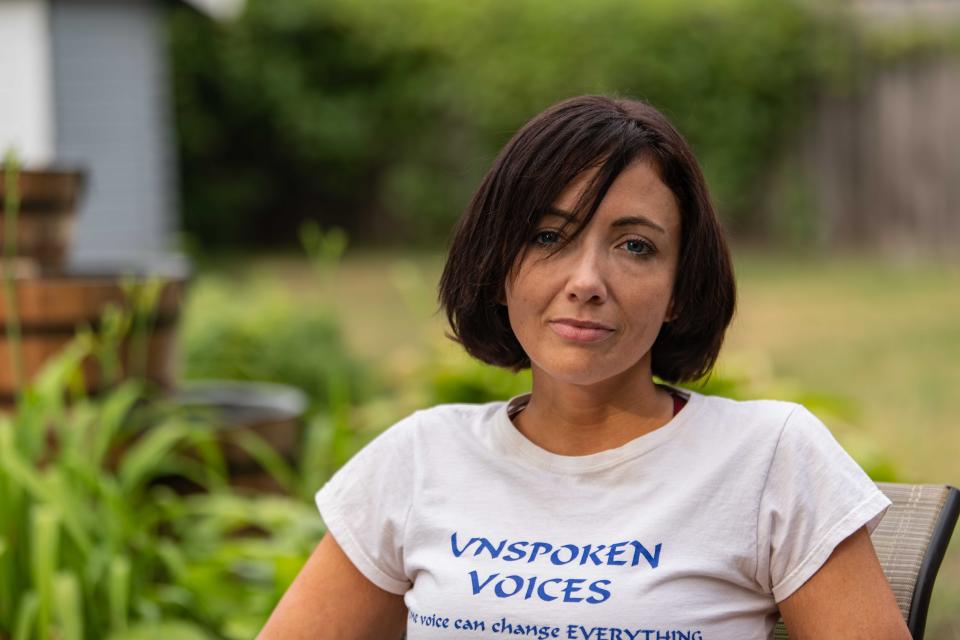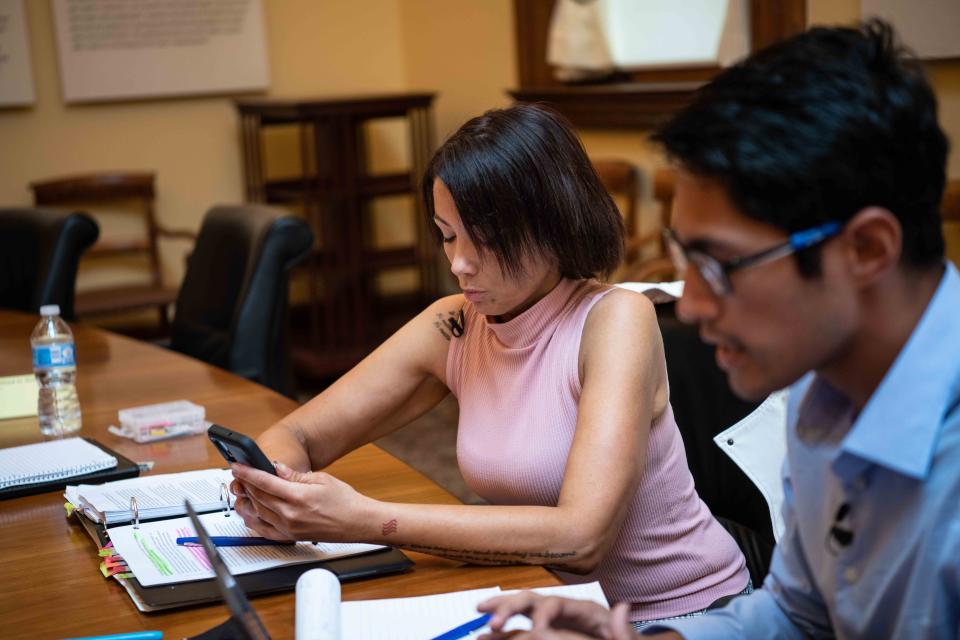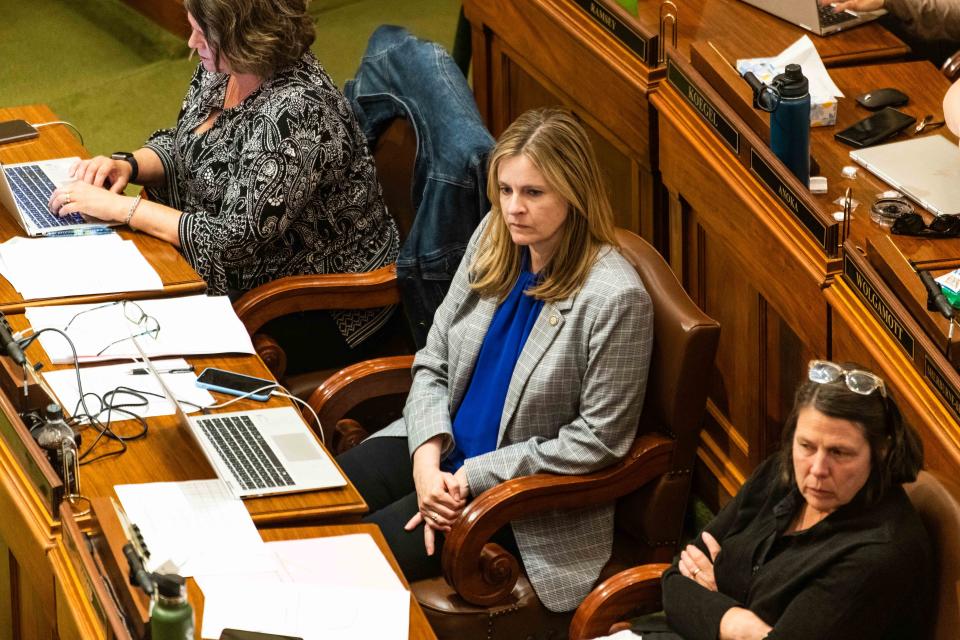Majority of states’ laws treat sexual assault perpetrators differently if victims drank

For KiloMarie Granda, it was supposed to be a casual night out with a co-worker. It ended up being the beginning of six months of hell.
Two drinks into that night in 2013, Granda wasn’t feeling well, so she went to her co-worker’s house to sleep before driving home to the Minnesota countryside. But the night took a turn for the worse.
“I was raped by a colleague,” Granda said.
After being cornered and assaulted multiple times, Granda managed an excuse that allowed her to leave and drive herself to a hospital for a rape examination, she told USA TODAY.
“Suddenly in one night, I faced losing everything,” she said, adding that the assault strained her relationships with her partner and her colleagues. She said she was reluctant to report the assault to police but did so at the insistence of her partner, leading to a monthslong ordeal.

What Granda didn't gain was a conviction, at least in part because she'd become mentally incapacitated by drinking alcohol by choice, a decision that was consequential in the eyes of the law. The county's records of the case have been sealed.
In March 2021, the Minnesota Supreme Court overturned a rape conviction involving an unnamed woman who reported an assault a few years after Granda. The ruling hinged on the statutory definition of mental incapacitation during an assault. Was a victim’s mental state altered because she had consumed drugs or alcohol on her own? Or was she incapacitated against her will?
Minnesota's felony sexual assault charges required the victim to be “mentally incapacitated,” defined as “rendered temporarily incapable of appraising or controlling his or her conduct due to the influence of a narcotic, anesthetic, or other substance administered to that person without his or her consent, or due to any other act committed upon that person without his or her consent.”
The ruling lit a fire under advocates who had been studying changes to Minnesota statutes to make them more fair to victims. A revised law, removing the differences in how a victim became incapacitated, took effect in September after nearly two years of work.
Minnesota was not alone in its treatment of sexual assault victims.
According to a USA TODAY analysis, a majority of states allow for a felony rape conviction only if a victim became incapacitated against his or her will.
At least 27 states have laws that distinguish between sexual assault victims who were forced to become intoxicated and those who chose to drink or take drugs. That distinction could determine whether charges are even filed, according to an USA TODAY analysis.
Other states have worked to change the disparity. North Carolina was successful. In New York, the effort has stalled.
The difference can have a profound impact on college students, who are more likely to be a victim of sexual violence. Such laws face criticism for promoting victim blaming.
Michal Buchhandler-Raphael, a professor at Widener University Commonwealth law school, told USA TODAY most states prohibit sexual relations with someone who is mentally incapacitated – which may include being intoxicated – but they don't treat victims equally.
“In most jurisdictions, the laws do distinguish still … between voluntarily intoxicated and involuntary intoxicated victims,” Buchhandler-Raphael said last summer before Minnesota's law was changed. “The law in Minnesota is not worse than the law in other states. It’s not that only Minnesota has this problem. It’s many, many other states.”

‘Not what we may wish the law was ...’
In May 2017, a woman who took five shots of vodka and a prescription narcotic was denied entry into a bar in Minneapolis for being too intoxicated. She and a friend were approached by Francios Momolu Khalil and two other men, who invited them to a house party.
When they got to the house, there was no party.
The woman, whose name was not used in court proceedings, testified she “blacked out,” didn’t remember lying down on a couch and woke up to Khalil sexually assaulting her. She told him, “No, I don’t want to,” before losing consciousness again.
After waking up the next morning and finding her shorts around her ankles, she called a Lyft, leaving the house with her friend, whom she told about the rape.
The next day, the victim went to Regions Hospital in St. Paul, Minnesota, for a rape examination. In the following days, she reported the assault to the Minneapolis Police Department.
Khalil was charged with felony third-degree criminal sexual conduct, which requires a victim to be mentally incapacitated. A Hennepin County District Court jury convicted him.
In March, the Minnesota Supreme Court overturned that conviction, determining that because the victim chose to have those drinks, she couldn’t be considered “mentally incapacitated” under the law’s definition.
Though the charges were disputed, the facts of the case weren’t.
“If the Legislature’s intended meaning is clear from the text of the statute, we apply that meaning and not what we may wish the law was or what we think the law should be,” Minnesota Supreme Court Justice Paul Thissen wrote. “We hold that the definition of ‘mentally incapacitated' … is susceptible to only one reasonable interpretation; namely, that alcohol causing a person to lack judgment to give a reasoned consent must be administered to the person without the person’s agreement.”
Khalil avoided a retrial by pleading guilty in August to unwanted sexual touching, a lesser charge but one requiring Khalil to register as a sexual predator for 10 years.
The victim shared her disappointment with Khalil’s plea deal in a statement read by Assistant Hennepin County Attorney Amy Blagoev.
"It is nearly impossible for me to accept this plea as a consequence for Mr. Khalil as it shows just how heavily the system itself fails me, victims and survivors from all over the world, of all sorts of forms of abuse. We need to do better as individuals. We need to do better as a state and we need to do better as a system,” the statement said.
A common challenge for victims across the country
KiloMarie Granda knows too well how differing perceptions of mental incapacitation in sexual assault laws can lead to a lack of justice for victims.
On Dec. 21, 2013, Granda and her co-worker went out for the evening. The co-worker introduced her to a vodka drink, Jeremiah Weed-and-water, and after two of them, Granda began to feel the effects of the alcohol. She suggested they go bowling, as they had planned, so she could sober up before driving home, but the alley was closed.
Her co-worker offered Granda the option of going to his house to play foosball or to sleep off the drinks – a suggestion she welcomed, concerned about driving to the Minnesota countryside while under the influence.
Years later, Granda recalls how awful she felt on the way to his home, slumping onto the car's middle console to rest.
Rather than getting sleep, Granda said, she was assaulted repeatedly.
The assault, as well as the pressure she faced to report it to police, strained several of Granda's relationships – personally and professionally, especially as those investigating the assault were co-workers of her partner.
The Stevens County attorney charged her colleague with four felony counts, all of which involved Granda being assaulted while incapacitated. The attorney told her the legal strategy might fail because Granda hadn't been involuntarily intoxicated, as those charges required by state law.
In June 2014, prosecutors dropped the charges. Granda said she wasn't surprised.
Granda served as the violence prevention and response program coordinator for the University of Minnesota, Morris. She worked with law enforcement and the county attorney on cases similar to her own, and she had seen other cases fall apart in a similar manner.
Her experience and outrage pushed her into advocacy, which allowed her to play a role in both the changed state laws and the lives of sexual assault victims – including Manny Houle.
Severe implications for college students
Differences in state sexual assault laws may be especially consequential for college students – something Houle experienced during his freshman year at the University of Minnesota, Morris.
At his first party while studying there in 2012, thrown to celebrate a wrapped theater production, Houle chose to drink with his friends.
Later in the night, Houle found himself locked inside a room, waking up in the middle of being assaulted. He was raped by an upperclassman who was in the production, he said.
“I don’t even think I wanted to have sex that night,” Houle said. Under Minnesota’s former law, “that’s not even a conversation, like, legally. It’s all thrown out the window, circumstances are thrown out of the window as soon as I say, ‘Thanks for the drink, buddy.’”

He dropped out of school, citing lack of support from his friends and the university and the trauma he suffered from the assault.
A few years later, Houle decided to pursue charges, with Granda's help.
“I felt like somebody was actually ready to be on my side, whatever the step I wanted to take was,” Houle said of Granda.
Houle didn’t get far.
According to Houle, the Stevens County attorney said he wouldn’t pursue rape charges unless he had concrete evidence, such as video.
Granda and Houle discussed the “realities” of his case, which would be more difficult to pursue because he had been drinking – under the same law that caused Granda’s case to collapse.
“I will not forget the feeling,” Houle said, remembering the conversation with Granda in a car outside the Stevens County Courthouse in Morris, Minnesota. “We cried because the people who were supposed to fight for me weren’t willing to step up.”

Most sexual assault victims are younger than 30. Women ages 16 to 19 are four times more likely to be a victim of sexual violence, according to the Rape, Abuse and Incest National Network.
LGBTQ students and students of color face an even higher likelihood. Twenty-one percent of transgender, genderqueer and nonconforming college students are at risk for sexual violence compared with 18% of non-transgender women and 4% of men, according to RAINN.
Gay men are 10 times more likely to be a victim of sexual assault than straight men, according to a report in 2014 on rape and sexual assault by the White House Council on Women and Girls.
“There’s several factors that make (the Minnesota) ruling, I think, so dangerous for college students in particular,” Sara Wilf, a doctoral student and a member of the Survivors and Allies organization at the University of California, Los Angeles, told USA TODAY.
“College students have higher rates of drinking alcohol than the general population,” Wilf said. “Colleges often have extremely harsh punishments for students who drink underage, and so that can stop survivors from coming forward.”
‘This really, really sends a victim blaming message’
Often, victims who report their sexual assault risk being revictimized.
When people who have been assaulted encounter victim blaming behaviors from institutions, including the justice system, it adds to the trauma.
“Rape is one of those unusual crimes where there are these aberrations of blame to the victim," David Buss, a professor of psychology at the University of Texas, Austin, told USA TODAY. "These circumstances that lead to self-blame and lead to other people to blame the victim that are entirely unwarranted.”
Victim blaming is when the victim – rather than the perpetrator – is held responsible for the crimes and acts committed against them, according to the Sexual Harassment & Rape Prevention Program at the University of New Hampshire.
Many advocates view sexual assault laws that treat mental incapacitation differently as a form of victim blaming, said Lizzie Mafrici, former president of Preventing Sexual Assault, a student group at the University of Maryland, College Park.
“I think that we often talk about victim blaming in a societal way, in a cultural way, in a criminal way, but it’s also in our legal system, and it’s also a systemic problem that we have to face,” Mafrici said.
Buss attributed the low report rate of sexual violence to the possibility of secondary victimization. "At least 75% of rapes are never reported, and I think part of that reason is precisely anticipation of getting retraumatized and further social, psychological harms.”
The National Institute on Alcohol Abuse and Alcoholism conservatively estimated that 25% of women have experienced sexual assault and half of those cases involved the consumption of alcohol by the victim, perpetrator or both. It’s difficult to accurately estimate the prevalence of sexual assault because cases go unreported.
“Although a woman’s alcohol consumption may place her at increased risk of sexual assault, she is in no way responsible for the assault," NIAAA emphasized in its report. "The perpetrators are legally and morally responsible for their behavior.”
Laura Palumbo, communications director for the National Sexual Violence Resource Center, called rulings such as the Minnesota Supreme Court decision “alarming” because of alcohol’s common role in sexual violence.
“What is really important to recognize is that people who commit sexual violence strategically use intoxicants, and so rather than focusing on the person who perpetrated sexual assault, this really, really sends a victim blaming message,” she said.
Reforming state laws
A few states have sought to change their criminal sexual assault laws, so the manner in which a victim became incapacitated isn't a factor.
The overturned conviction in Minnesota came as legislation to revamp the state’s criminal sexual conduct statute – including addressing the definition of mental incapacity – moved through the Legislature. The changes were the result of nearly two years’ worth of work by a group assigned to examine the law.
The new law took effect Sept. 15 and reflects many of the group’s recommendations. Democratic state Rep. Kelly Moller, the bill’s co-sponsor, said that includes removing the “voluntary intoxication loophole,” which would allow sexual assault convictions regardless of whether the victim willingly ingested drugs or alcohol.

“For a victim who decides to report, we want to give prosecutors all the right tools in their toolbox so that these cases can be charged, and justice can be provided for these survivors,” Moller said. “There are things we can do with the Legislature, and we are doing, but then there are sort of these cultural shifts that need to happen, too.”
After Granda’s case was dismissed in 2014, she launched a nonprofit advocacy organization – Unspoken Voices – and fought Minnesota’s statute. She was a driving force behind the recent legislation.
“I took what I had learned through what the system had done to me and with me, and I began reaching out to other individuals and other communities that I knew were the most marginalized and that had this happen the most,” Granda said. “This organization became basically a microphone to amplify the voices of those from these communities that weren't previously heard.”
North Carolina preceded Minnesota in changing its sexual assault statutes.
Through a large, collaborative bill, the state’s definition of “mentally incapacitated” was rewritten, no longer differentiating between whether someone chose to consume drugs or alcohol or if consumption happened by force. The law took effect at the end of 2019.
Former state Rep. Chaz Beasley dove into inequities in that state’s sexual violence statutes after being approached by Leah McGuirk, a North Carolina woman who was drugged at a rooftop bar in 2018 but couldn’t file a police report because being drugged wasn’t necessarily a crime.
“We started digging into our laws, found that there (were) these glaring, glaring loopholes,” Beasley, a Democrat who represented the Charlotte area until January 2021, told USA TODAY.
His bill, which the majority of the state House co-sponsored, was combined with another bill changing sexual assault and child protection laws to form a large, more comprehensive bill.
“It doesn’t surprise me that there are some pretty big loopholes and blind spots in our laws,” Beasley said. “I think that across the country, what we did find was that our sexual assault laws, our child protection laws are behind the times, and they need to be updated and that they really need to be updated regularly.”
Unlike Beasley, New York state Sen. Alessandra Biaggi has not had much luck getting her bill passed to remove the intoxication loophole from the state’s penal codes.
Within days of hearing about the intoxication loophole, Biaggi crafted a bill that would close it and introduced it to the state Senate.
“New York has this really important reputation, I think, in this country and also in the world as this leader on a lot of things, very progressive, very much on the right side of issues most of the time, if not a majority of the time, and so when it comes to these things, it’s just very disappointing,” Biaggi said. “Essentially what the state of New York is saying to survivors of rape and victims of rape is too bad, and that’s not acceptable to me, and it shouldn’t be acceptable to any New Yorker who understands and learns about these issues.”
If you are a survivor of sexual assault, RAINN offers support through the National Sexual Assault Hotline (800-656-HOPE and online.rainn.org).
This article originally appeared on USA TODAY: How sexual assault victims became incapacitated often decides charges

 money
money 